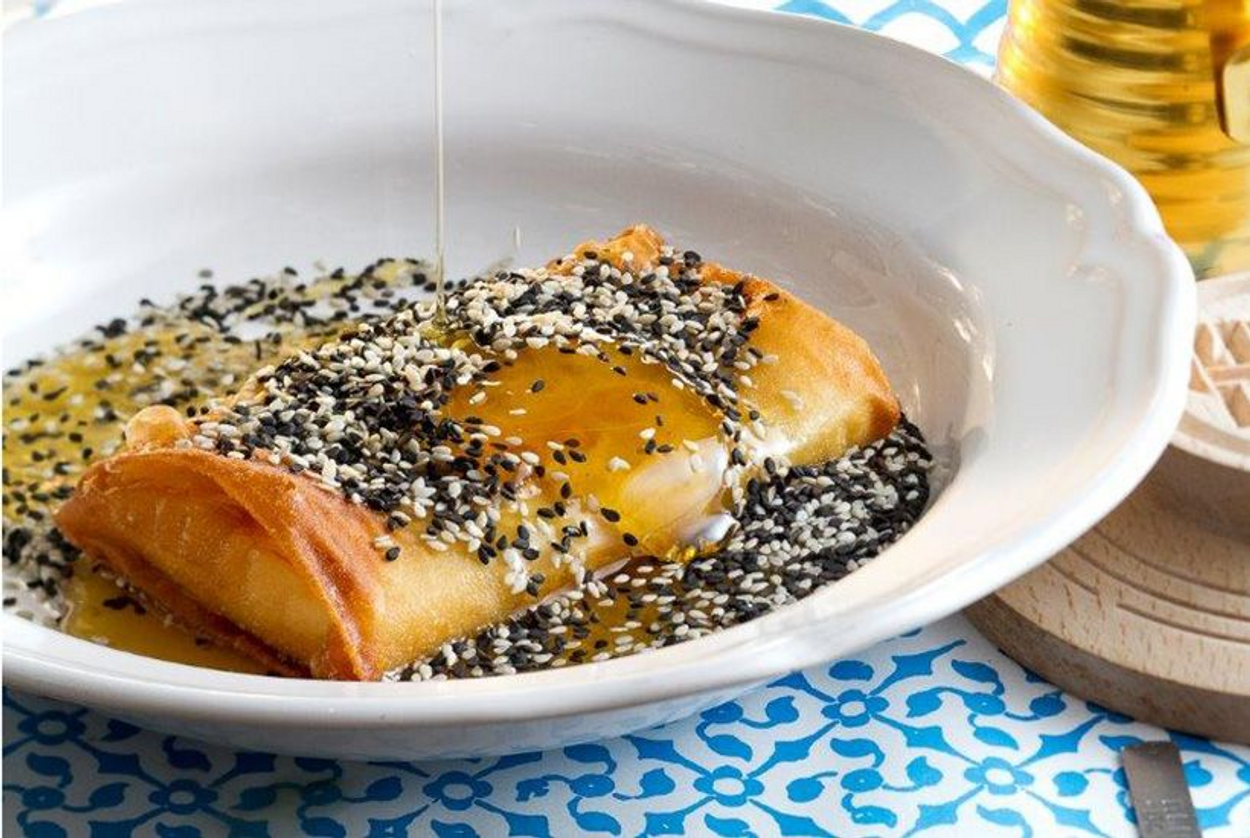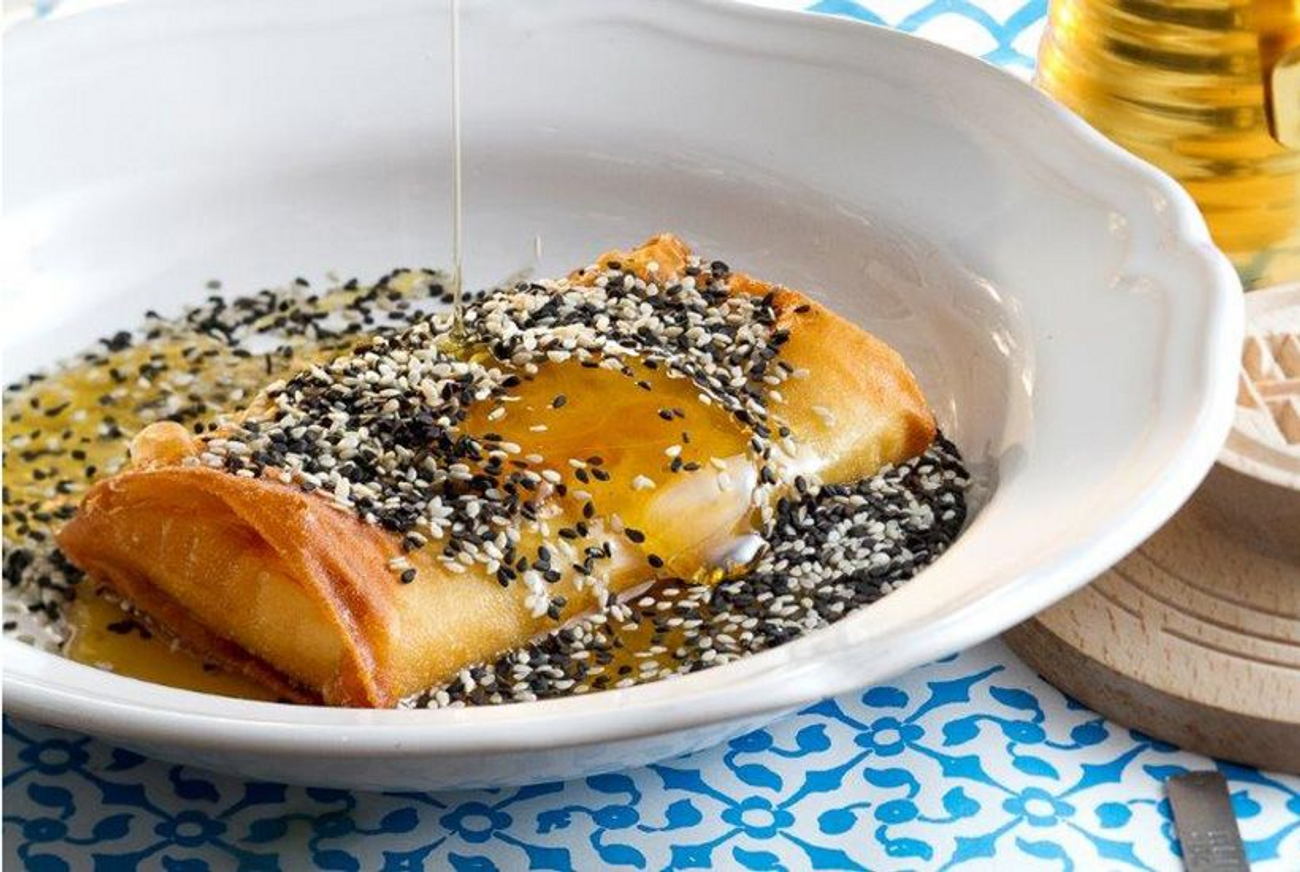From Souvlaki to Eggplant Salad, Greek Cuisine Is on the Rise in Israel
A new restaurant, a cookbook, and a revived market point to the growing popularity of Balkan food, which has a long history here




Israelis have long been drawn to Greek food. Many Israeli restaurants host occasional “Greek nights” or serve a few Greek items—mostly small dishes known as meze—as part of a broader menu. There are even a few Greek-inspired eateries, including Yassou—a modern tavern in a Tel Aviv beachfront hotel—and the Mediterranean-flavored Kalamata in Old Jaffa.
“Israelis love Greek and Balkan food because it is a cuisine that is close to us and feels familiar but also exotic,” explained Gerda Glezer, editor of Walla!Food. “The Greek climate is similar to ours, and this is the kind of food that is easy and fun for Israelis to relate to.”
In recent years, Glezer noted, Greek food has seen a “rise in popularity” in Israel, as part of “an ongoing process.” That rise has recently become even more prominent thanks to the revival of a major food market founded by Greek Jews, the opening of a new restaurant earlier this year, and the publication of a new cookbook last month.
***
In Israel, Greek food is often lumped together with Turkish and Bulgarian food; these cuisines are collectively known as Balkan. In the 1960s and ’70s there were a lot of great Balkan restaurants in Israel. One of the country’s most legendary culinary establishments opened in 1932 on Ha-Kishon Street in Florentin—a neighborhood in the south of Tel Aviv that was established by Jews from Thessaloniki (also known as Salonica). Back then the restaurant was called Olympus and served Balkan delicacies like moussaka and tzatziki. In the early 1960s, the three co-owners split—one remained at Olympus, and the other two opened their own Balkan-Greek eateries: Olympia and Acropolis. All three were successful in the 1960s and ’70s, but the one everyone remembers is Olympia. Due to its location on Karlebach Street, which is close to the Kirya—the Tel Aviv District government center and the major Israel Defense Forces base—it was frequented by major military and government figures like Ezer Weizman, Yigal Allon, Moshe Dayan, Ariel Sharon, and Yitzhak Rabin, who made decisions and closed political deals with a glass of ouzo in their hand. After another location change, Olympia permanently closed 10 years ago. Acropolis on HaMasger Street closed a few years ago, too, but Olympus still exists on another corner of Karlebach Street, where it moved in 1991. Today’s owners are Yona Nachman, whose father was one of the owners starting in the 1950s, and his son Gadi; they serve Greek-Turkish-Balkan food, including legendary leek patties, to this day.
Zviki Eshet, who opened the new restaurant Greco a few months ago in a residential neighborhood in the north of Tel Aviv, remembers the old eateries: “In the ’60s and ’70s Greek food was very popular in Israel,” he noted. “But later on, when other kinds of restaurants started opening, the public lost interest in Greek food. Many of the Greek restaurants either closed or changed and lost their Greek identity.”
What sets his new restaurant apart from the others that have remained, said Eshet, is the authenticity of the recipes. “We serve 100 percent real, authentic Greek food, without adding a bit of Italian, like a lot of other places do, and without creating Israeli versions of the dishes,” said Eshet, whose menu ranges from gyros and souvlaki to spanakopita and moussaka, grilled lamb chops to pickled octopus. “We leave the Greek recipes exactly as they are.”
Although Eshet isn’t Greek himself, he said, “I’ve always loved Greece, and I’ve been visiting the country regularly for 30 years now. I have been in the restaurant business for many years, and opening an authentic Greek restaurant was always a dream of mine. We work closely with Greeks and learn all there is to know in order to give people a true Greek experience from top to bottom.”
***
Shaily Lipa had previously published seven cookbooks in Israel, but her latest—which came out in Hebrew just before Passover—is the first to go back to her family’s roots. My Balkan Kitchen, published by Al Hashulchan Gastronomic Media, offers Jewish recipes from Southeast Europe. “The book is based on the cuisine of the Sephardi Jews and offers many recipes that only a Balkan Jew would know,” Lipa explained. “For instance mina pie, which is a matzo-pie for Passover; bumelos de masa, which is sweet matzo-patties; burekitas de kalavasa, which is sweet pumpkin burekitas, and more.” There are also many Greek recipes in the book, like Greek eggplant salad, Horiatiki salata (Greek salad), taramasalata (fish roe meze), faky soupa (Greek lentil soup), kolokythokeftedes (zucchini and feta balls), tzatziki, reynado (vegetables filled with meat), souvlaki, and more.
“For me, this was a fascinating journey back to the kitchens I grew up in and to the cooking style that molded my culinary fingerprint,” said Lipa, whose paternal grandparents came from Thessaloniki and maternal grandparents came from Istanbul. “At home everybody spoke Ladino, and the food was Balkan from every side.”
Balkan food was always popular in Israel, she explained: “The Balkan cooking techniques and raw materials are similar to the Israeli ones, which has to do with the fact that the Ottomans ruled over Palestine for 400 years. The dishes are very similar from one Balkan country to another, and sometimes they are even the same. They all use the same basic materials: olive oil, filo pastry, peppers, salty cheeses, yogurt, lamb, quinces, honey, etc.”
One of Lipa’s favorite places is Tel Aviv’s Levinsky Market. This foodie haven, located next to Florentin, is not an ordinary market with fruit and vegetable stalls; founded by Jews from Thessaloniki in the late 1920s, it has Balkan delis selling olives, cheeses, and spices, as well as filo-filled bakeries and ethnic restaurants—Greek, Turkish, Persian, etc. “I grew up in Levinsky Market. I went along with my father and grandfather every week when they went to the market, and I go there often to this day,” Lipa said. “It is a very popular market because of its Balkan food, or maybe it’s the other way around—maybe Balkan food is so popular because of Levinsky Market. It’s like the egg and the chicken.”
While it still retains much of its original character, Levinsky Market is having a big revival these days: New restaurants opened, culinary tours took off, and the market garnered a great deal of media attention, drawing in new customers and tourists. A younger generation started running old family businesses and delis, bringing with them a new understanding of today’s culinary scene; in addition to the traditional items they’d always sold, for instance, the delis started selling new products, often imported, and the market began to cater more specifically to cooks and foodies.
Avivit Priel and Limor Lami opened Ouzeria in the area in 2012. When returning from yet another trip to Greece they searched Tel Aviv for a location to open their Greek-inspired business. “When we got to Levinsky Market it reminded us so much of Psyri—a fun neighborhood in Athens, with small houses and full of bars. Only afterward I found out that the market was established by Greek Jews. It fit perfectly, and I think that the revival of Levinsky Market is part of a global phenomenon. Excellent eateries are opening in markets all around the world, which makes perfect sense.”
An ouzeria is a type of Greek tavern that serves ouzo and meze, and while Tel Aviv’s Ouzeria is certainly inspired by the original concept, it isn’t an exact replica. “Greece is my favorite country, and I’ve been there more times than anywhere else,” Priel told me. “I love the concept of the ouzerias. They’re fun and more casual than restaurants, but the food we serve isn’t exactly like in a traditional ouzeria. Our food isn’t just Greek, but Mediterranean in general. My son, who is 9, says: ‘This is a Mediterranean restaurant with a Greek atmosphere.’ ”
Levinsky Market’s revival is felt not only in new eateries that pop up nearby but also in the market’s stores themselves. Brothers Yomi and Eitan Levi are third-generation owners of family business Yom Tov Deli, which their grandfather, Yom Tov, opened in 1947. Their deli is one of the market’s best-known institutions, and last year it even made it to the Saveur 100 list, together with the whole market.
Yom Tov Deli is a perfect example of the way the market never abandons its roots even as it looks forward. “Our grandfather was the owner of one of the very few kosher delis in Istanbul,” Yomi told me. “He learned how to be a meze master, which is an established profession in Turkey. This means he knows how to smoke fish and sausages, how to pickle fish, and all those things. Our father, who was the owner before us, sadly passed away, but our grandfather still works with us. He rolls the vine leaves around the dolmas to this day.”
Yomi and Eitan are well aware of the needs of the gourmet generation, and while their deli offers homemade delicatessen, it also has fine imported fish and olives from Greece, Turkey, and Italy. “Israel is moving forward fast in culinary terms and the revival of Levinsky Market is part of this,” Yomi told me. “I would say the revival started about five years ago, when the trendy vegetarian Caffe Kaymak opened in the market. After that more new eateries started popping up. There are also many culinary tours of the market, which bring new people to it. I grew up here, and I know the market like the palm of my hand. Thankfully large chain-stores haven’t infiltrated Levinsky, like they have the Carmel market. Levinsky is still based on small businesses, where the owners serve the clients, which is very important. And from a culinary point of view, here you can find things that you just can’t get anywhere else. Balkan cold-cuts, for instance, like the kind you have in Greece, Turkey, and Armenia, are very popular. And of course you can still get great burekas.”
“The revival of Levinsky Market, which started when trendy places like Kaymak, Bistro Yahaloma, and Tony ve’Esther Coffee House started opening in the area, is a big part of the reason that Greek and Balkan food is so popular in Israel now,” Glezer said. “Another reason is the tendency of Israeli chefs to go back to their roots. Being a young country, we are still searching for our identity, and Balkan food is where the roots of Sephardi Jews are. Balkan food is part of our DNA.”
***
Like this article? Sign up for our Daily Digest to get Tablet Magazine’s new content in your inbox each morning.
Dana Kessler has written for Maariv, Haaretz, Yediot Aharonot, and other Israeli publications. She is based in Tel Aviv.
Dana Kessler has written for Maariv, Haaretz, Yediot Aharonot, and other Israeli publications. She is based in Tel Aviv.